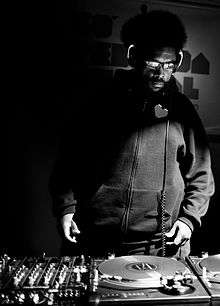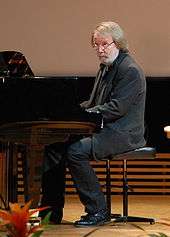Guldbagge Award for Best Original Score
| Guldbagge Award for Best Original Score | |
|---|---|
| Country | Sweden |
| Presented by | Swedish Film Institute |
| First awarded | 2011 (for film scores released during the 2011 film season) |
| Currently held by |
Peter von Poehl, Ravens (2017) |
| Website | guldbaggen.se |
The Guldbagge for Best Original Score is a Swedish film award presented annually by the Swedish Film Institute (SFI) as part of the Guldbagge Awards (Swedish: "Guldbaggen") to film composers working in the Swedish motion picture industry.[1]
Winners and nominees
Each Guldbagge Awards ceremony is listed chronologically below along with the winner of the Guldbagge Award for Best Original Score and the film associated with the award. In the columns under the winner of each award are the other nominees for best music.

Questlove co-won the award in 2011 for The Black Power Mixtape 1967–1975.

Benny Andersson won the award in 2012 for Palme.
See also
Notes and references
- ↑ Svenska Filminstitutet. "Tidslinjen del III: 1984-1993". Guldbaggen.se (in Swedish). Retrieved January 9, 2015.
- ↑ Fellman, Erik (January 23, 2012). "Guldbaggen 2012 : Vinnare" (in Swedish). Filmkritikerna. Retrieved January 13, 2016.
- ↑ "Nomineringarna till Guldbaggen" (in Swedish). Sydsvenskan.se. Retrieved January 3, 2013.
- ↑ Fellman, Erik (January 21, 2013). "Guldbaggen 2013 : Vinnare" (in Swedish). Filmkritikerna. Retrieved January 12, 2016.
- ↑ Svenska Filminstitutet (January 3, 2014). "Nominerade". guldbaggen.se (in Swedish). Retrieved 12 January 2016.
- ↑ "Guldbaggen 2014: Vinnarna" (in Swedish). MovieZine.se. January 21, 2014. Retrieved January 12, 2016.
- ↑ Svenska Filminstitutet (January 8, 2015). "Nominerade". guldbaggen.se (in Swedish). Retrieved 8 January 2015.
- ↑ "Alla vinnare Guldbaggen 2015" (in Swedish). SVT. January 26, 2015. Retrieved January 12, 2016.
- ↑ "Nominations for the 2015 Guldbagge Awards" (Press release). Swedish Film Institute. January 4, 2016. Retrieved January 5, 2016.
- ↑ Norman, Isabel; Nykänen, Joni (January 18, 2016). "Glädjevrålet på Guldbaggegalan" (in Swedish). Aftonbladet. Retrieved January 19, 2016.
- ↑ Anderberg, Carl Adam. "Nominerade" (in Swedish). Moviezine. Retrieved January 4, 2017.
- ↑ Folcker, Sebastian (January 23, 2017). "De blev årets vinnare". SVT (in Swedish). Retrieved January 23, 2017.
- ↑ Haimi, Rebecca (January 4, 2018). "Flest nomineringar till Borg – Östlund: "Det känns okej"". SVT (in Swedish). Retrieved January 5, 2018.
- ↑ Pettersson, Leo (January 22, 2018). "Glädjetårar efter Sameblods succé". Aftonbladet (in Swedish). Retrieved January 22, 2018.
External links
- Official website (in English)
- Official website (in Swedish)
- Guldbagge Awards on IMDb
This article is issued from
Wikipedia.
The text is licensed under Creative Commons - Attribution - Sharealike.
Additional terms may apply for the media files.